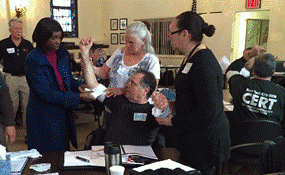Surviving a Disaster: Citizens, community groups learn search and rescue techniques
 COLLEGE STATION – To survive a disaster, minutes count and so do preparation and training.
COLLEGE STATION – To survive a disaster, minutes count and so do preparation and training.
If a tornado or earthquake destroyed your home and trapped a family member inside, would you know what to do? Often the first successful rescues are made shortly after an incident by family, friends or members of the local community, before emergency responders arrive on the scene.
An innovative training program offered by the Texas A&M Engineering Extension Service (TEEX) provides training in the basics of search and rescue techniques for the general public and community-based groups. The 12-hour course, “Search and Rescue in Community Disasters,” is taught by experienced urban search and rescue specialists, and includes discussions and scenario-based activities.
During this training, you can learn to safely conduct a search and light rescue response to aid family members or neighbors immediately following a natural disaster or human-caused incident, said TEEX Program Director Rick Comley.
Disaster planning guidelines call for families to be prepared to support themselves for up to 72 hours after a disaster, while awaiting emergency responder arrival.
 “We want you to be able to help yourself and your family to prepare and survive the initial impact of a disaster,” Comley said. “We use non-technical terminology and provide basic search and rescue training for those not involved in emergency response so they can be better prepared to support themselves and their families after a disaster.”
“We want you to be able to help yourself and your family to prepare and survive the initial impact of a disaster,” Comley said. “We use non-technical terminology and provide basic search and rescue training for those not involved in emergency response so they can be better prepared to support themselves and their families after a disaster.”
There is no charge for the course and potential audiences include civic or church groups, American Red Cross, scouts and youth groups, Non-Governmental Organizations (NGOs), volunteer fire departments, Community Emergency Response Teams (CERTs), and other interested members of the community.
The course is offered by TEEX’s National Emergency Response and Rescue Training Center and is currently under review by DHS/FEMA for certification through its Homeland Security National Training Program Cooperative Agreement. It will be the first DHS/FEMA-funded course under the National Training Program Cooperative Agreement that focuses on non-first responders in the community who are disaster victims.
For more information about the course, call 1-855-245-1614.
Photo Captions: Susann Brown demonstrates how to use a board as a lever and students practice bandaging a volunteer victim.’
Media Contacts:
Brian Blake, Communications Director
[email protected]
PH: 979-458-6837, Cell: 979-324-8995
Will Welch
[email protected]
PH: 979-458-6979, Cell: 979-220-2840
